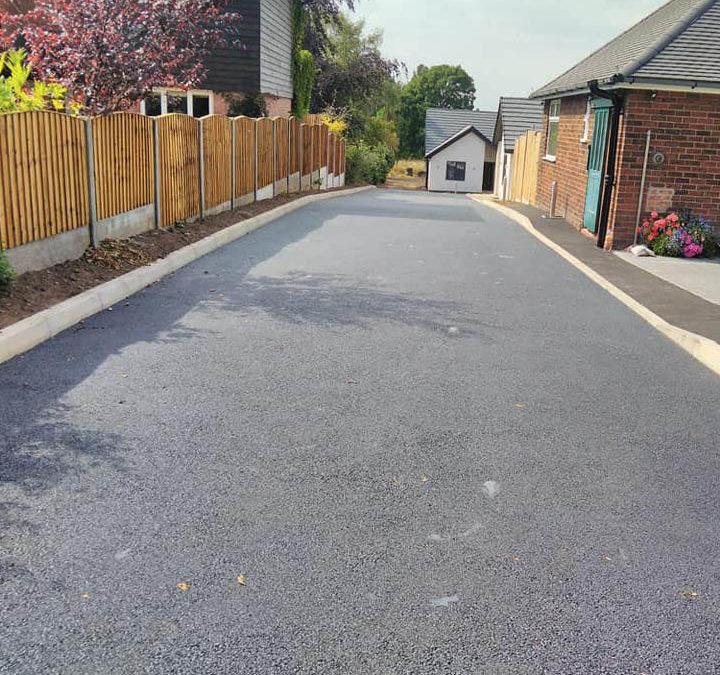Tarmac is cost effective. Those seeking to improve the look of their home and to add some kerb appeal should consider a tarmac driveway over a concrete one. Tar is the black material we get from coal. It has aesthetic value and it takes about half the time to install than it does a concrete one.
The construction time of building a road or driveway in preference to a concrete one is also exacerbated by the maintenance of the two road surfaces. Tarmac drives and roads rarely need maintenance and if cracks, potholes or resealing is needed, the tarmac surface can be easily rectified.
The Hardy Nature of Tarmac
A tarmac surface can handle just about anything you throw at it. Heavy rain, snow, high winds and even thunderstorms just don’t seem to faze this surface at all. It will take on a motorbike or a 40-tonne lorry with consummate ease.
So, you can imagine how a tarmac driveway – which will only see your gently parked car moving on or off – will last a lifetime. Be sure to use a reputable tarmac company that has a proven track record of high quality installations.
Tarmac has a smooth surface that will help to prevent skidding. A handy finish knowing you are not likely to thump into the garden fence or the garage door. For the best finish local tarmac driveways companies use a topping of SMA.
Tarmac is good for the Environment Too
Tarmac allows for street markings to be easily seen by other road users. However, the impact on the environment makes tarmac a very good choice. While concrete is perfectly good for the planet in that it uses a mixture of ballast, limestone and plenty of water, tarmac is a special surface that can be recycled time and time again.
There is no limit to the amount of times you can dig up a tarmac road and relay the surface using the originally laid materials that have always been there. Tarmac also does not run into the water systems like some other materials do.
As any roadbuilder will tell you: tarmac is very quick to solidify and takes very little time to reach its solid state than concrete or mortar does.
Driveways made from materials other than tarmac have proven time and time again to be an inconvenience. A driveway made from block paving can see grass or weedy plants attempt to grow in between the cracks. A tarmac driveway has no such issues with ongoing maintenance from weeds or grass growing in areas where it is not welcome.

Is There A Difference Between Tarmac and Asphalt?
As far as road surfacing goes, tarmac and asphalt are the world’s most widely used materials; but try telling the difference between the two and you would have a very difficult task. Even the trained eye in road construction can struggle to see what road surface is tarmac and which one is asphalt.
Tarmac
Tarmac is an abbreviated term for tarmacadam. Tarmacadam was developed and constructed by the Scottish engineer John Loudon McAdam. He created the method of the macadam road. This basically is where a road builder laid crushed gravel and stone to the road surface.
Tarmac is the substance unwittingly discovered by Edgar Purnell Hooley in 1901. He was walking in the Derbyshire industrial heartland when a road made from waste slag and spilled tar had formed unintentionally. Hooley noticed this “road” was dust free and firm. The idea of patenting this road material formula was put into practice by Hooley in 1902.
Asphalt
Asphalt roads and runways have replaced the tarmac road in many areas. Naturally occurring tar is no longer and bitumen has taken over as the main material. Now we have a system called “bitumen macadam” roads. In the UK, this is shortened to “bit-mac” when referring within the road construction industry. However, in Ireland it is the known as asphalt.
Asphalt is cheap and ideal as a surface for larger areas. Runways and car parks are perfect for the asphalt construction method. However, asphalt driveways are rare because the set up costs make it too uneconomical for smaller surfaces. In these instances, tarmac driveways are a far more economical solution.
Asphalt Driveways as a Block Booking
As the set up costs of constructing an asphalt driveway are a little on the high side, it might be a prudent suggestion to get the entire street or several of the neighbours together to have driveways all built [using asphalt] at the same time. This will reduce the set up costs to a similar price of a tarmac cost and the savings can be passed on to the customer.
Asphalt in Varying Colours
Asphalt is usually black but other colours can sometimes be seen. Blues, reds, greens and even gold-coloured roads can be made from changing the mixture of bitumen to suit. Tarmac can also be presented in a variety of colours too. The garish colours of roads are often found in places like school playgrounds or theme parks.

